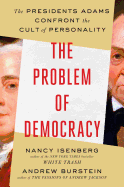
American politics celebrates (and often rewards) style over substance. While this may seem to be a recent byproduct of celebrity-obsessed culture, The Problem of Democracy demonstrates, through the lives of second and sixth presidents John Adams and John Quincy Adams, how the cult of personality has always trumped democracy.
Nancy Isenberg (White Trash: The 400-Year Untold History of Class in America) and Andrew Burstein (The Passions of Andrew Jackson) note that both men believed in representative democracy--the concept that a select, educated electorate should choose the most accomplished candidate for the presidency. Father and son also felt "the right ideas had to sway the most people." Yet these principles weren't enough for either Adams to win re-election. They were defeated by Thomas Jefferson and Andrew Jackson, respectively--candidates who invented "public identities in order to acquire attention and impress voters." Furthermore, Jefferson's and Jackson's outsized personalities were bolstered by large followings and the enthusiastic support of the national media.
Image-making, Isenberg and Burstein argue, is the true American political heritage. The Adamses identified it in their respective opponents and, to their detriment, emphatically criticized the "ecstatic, celebratory, self-congratulatory script that grew into the political faith we know as American exceptionalism." Isenberg and Burstein remind us of the importance of recognizing and remembering that the cult of personality is not a new phenomenon in American politics, and has long been a determining factor. --William H. Firman Jr., presidential historian and writer

